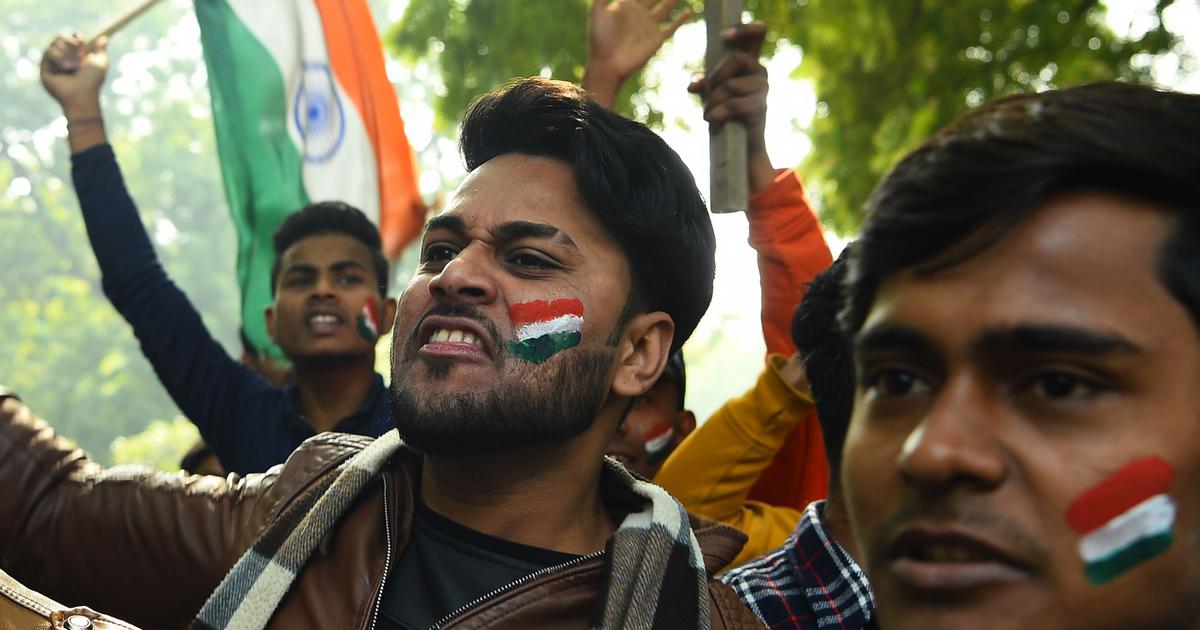On Saturday evening, approximately 300 people marched through the narrow lanes of South Delhi’s Khirki Extension, chanting slogans against Pakistan, seeking revenge for the February 14 attack on a Central Reserve Police Force convoy in South Kashmir that killed over 40 personnel.
As the procession went past, some shop owners and bystanders joined in the sloganeering. In one of the colony’s parks, a loudspeaker started to blare out songs from Bollywood war movies.
This was one of more than 100 rallies and candlelight vigils that have been held in across Delhi since February 15 to commemorate the Pulwama attack – the second most deadly attack in the history of the Central Reserve Police Force.
“It has now been proved that the surgical strike was a failure and Pakistan has not learnt any lesson,” said KC Rana, the general secretary of the Khirki residents’ welfare association, who helped organise the rally in his neighbourhood. He was referring to the strikes across the Line of Control by Indian troops in September 2016 on what the Bharatiya Janata Party government described as terror launch pads.
“India has to take immediate and strong action, nothing short of a war,” said Rana. “The objective of the march was to send this message across.”
The majority of the Delhi events were organised by members of the city’s residents’ welfare and traders’ associations. A few were organised by Hindutva groups.
On the afternoon of February 15, one meetings was held near India Gate, in central Delhi. The gathering became so large that the police had to barricade the road connecting India Gate with Rajpath and Man Singh Road to accommodate the growing crowd in the high-security zone.
Here too, the protesters chanted slogans criticising Pakistan, asking India to avenge the death of its troops. The participants of this gathering were from all walks of life: including students, traders, corporate employees and the unemployed. Most said that they did not belong to a specific political group.
Meanwhile in Gurgaon on Sunday night, "New India" is on display. pic.twitter.com/ErOUTPbv9o
— Sunit Arora (@sunitarora) February 18, 2019
‘No war’
Though the chants for action against Pakistan were loud and recurring, not everyone seemed to be keen on war.
“What we need right now is a solution that brings peace,” said Satnam Arora, the president of a residents’ welfare association in central Delhi’s New Rajinder Nagar that had organised a protest rally on Saturday. “Being reactionary and demanding a war will not bring a solution. One has to introspect. The objective of our rally was to send this message to the government. Violence brings more violence and the worst sufferers are the people who have nothing to do with politics.”
In neighbouring Old Rajinder Nagar, an environment protection event scheduled for Sunday afternoon was converted at the last-minute into a programme to commemorate the Pulwama attack. It was christened Balidan Diwas or Day of Sacrifice. At that event, children sang patriotic songs. Balidan Diwas is usually observed on March 23, the day freedom fighters Bhagat Singh, Sukhdev and Rajguru were hanged by the British in 1931.
Ram Kumar Gupta, the president of a residents’ welfare association in central Delhi’s Rajouri Garden, also cautioned against war. He said people were angry and sad at the terror attack but that did not mean they wanted India to wage war against Pakistan.

Communal angle
There have been concerns that some groups were attempting to fan communal fires with these protests.
On Saturday, in a letter addressed to Delhi Police Commissioner Amulya Patnaik, the chairperson of the Delhi Commission for Minorities, Zafarul Islam Khan, said certain groups were using these protest rallies to “vitiate the atmosphere” in Delhi and “start riots”, reported The Wire. The website referred to one such rally in South Delhi’s BK Dutt colony whose participants chanted provocative slogans directed at Muslims.
Vijay Sharma, president of the Resident’s Welfare Association in the area, told Scroll.in that the rally was organised by residents but it had not been held under the association’s banner. He said he was not present at the rally but had heard about it. He added that he did not know whether communal slogans were shouted at the event.
Muslim-dominated localities in Delhi such as Shaheen Bagh and Jamia Nagar also saw rallies on Saturday. Most of the participants in the rallies were Muslim residents of the localities, the residents said.










